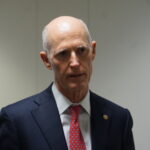Venezuelans now surpass Mexicans as the largest nationality arrested for illegally crossing over the border, reported the U.S. Customs and Border Protection. According to the agency, in September, Venezuelans were arrested 54,833 times by the Border Patrol after entering from Mexico, more than double from 22,090 arrests in August. Mexicans, on the other hand, were arrested 39,733 times in September.
More than 250,000 Venezuelans arrived in the U.S. in the last few years, making it the fastest-growing migrant population in the U.S.
However, this might be changing if the economic upswing expected from Biden’s recent economic sanctions relief for Venezuela pans out. On October 18, the Biden administration partially eased sanctions on Venezuela’s oil and mining sector in response to the electoral agreement signed between the government of Nicolas Maduro and the Venezuelan opposition.
The move is expected to jump-start a moribund economy that has contracted severely and, in the process, curb a heightening exodus of Venezuelans, looking for a chance to feed their families.
Asdrubal Oliveros, a Venezuelan economist who heads Ecoanalitica, said to the Venezuelan daily El Nacional that “the partial sanctions’ relief for the oil sector could represent additional revenues to Venezuela, of between 45-50%,” which would be equivalent to “between $5 - $7 million” extra revenues. He added, “2024 will be a different year in economic terms to 2023… as 2023 will end with growth close to zero, while next year will close with a growth close to 10%,” he added.
Venezuelan economist Luis Oliveros believes that increased State revenues should translate into reduced inflation and deceleration of exchange rate increases. However, he expects that the economy will continue to suffer before it picks up after sanctions relief takes effect. “If the fiscal situation improves, inflation should improve, and exchange rate volatility should be reduced. This will surely impact Venezuelans’ quality of life and real earnings. However, sanctions relief will not do away with our economic problems, although our prospects will improve,” Oliveros told Talcualdigital.com.
IESA Professor Michael Penfold said that sanctions relief for the oil and gold sectors and the Venezuelan Central Bank “will have a significant economic impact… as it implies that Venezuela will be returning to global oil markets.”

For his part, economist Luis Vicente Leon believes that the recently announced sanctions relief is “a golden opportunity” to relaunch the country to international oil trade, reconnect with large oil investments, and get support for the process from Western operators. “This is not sanctions elimination but sanctions flexibilization, which will benefit the Venezuelan economy, as state oil company PDVSA will be able to trade its product in international markets without bartering a single barrel and without any oil price increase, although we hope crude prices increase so oil revenues double,” Leon told a Venezuelan news portal.
Hardline American lawmakers like Sen. Marco Rubio (R), believe that the existing sanctions against Venezuela must stay in place regardless of whether they are working or not, but several Latin American experts, and a growing number of U.S. lawmakers, support the notion that those sanctions need to be either lifted or at the very least, reassessed.
Rep. Thomas Massie (R-KY) recently said that he is against any economic sanctions, specifically against sanctions on Venezuela because they have only “punished the people in the country, not the government.”
“I’m not for any sanctions. I don’t vote for any sanctions, so if there are sanctions, I'd get rid of them unconditionally,” said Rep. Massie. He added, “Are the sanctions contributing to the crisis? Well, that's my whole position on sanctions. I think they punish the people in the country, not the government, so I’d get rid of the sanctions.”
House and Senate Democrats support President Biden’s easing of the sanctions but do so cautiously considering Maduro’s track record.
“We have to be very careful about our sanction policy in Venezuela. Obviously, we're seeing an influx of asylum seekers come from Venezuela and I think we should do everything possible to stabilize their government, but also not to incite more civil unrest that's going to cause more people to continue to leave the country,” said Rep. Gabriel Vasquez (D-NM).
Rep. Vasquez also believes that, regardless of who is in power, the U.S. needs to work with Maduro, or whoever, to “help support a functioning government.”“We absolutely need stability in that government, and we need free and fair elections. And this is a critical place in the world for us to have influence and for us to help support a functioning government,” added Rep. Vasquez. He also believes that “We will have to really think about our foreign policy to deal with Venezuela and some of the surrounding countries as well, whether it's the person in charge that we want or not, we can't not try because [that is] one of the ways that we can stem the root cause of migration and asylum seekers into this country.”
Texas Congressman Joaquin Castro (D) said that the U.S. needs to see how this initial compromise with the Maduro regime “works out” first.
Rep. Darren Soto (FL-D), posted on his X account, “We appreciate @POTUS’ support for Venezuela democratic opposition’s efforts for a competitive, internationally monitored election next year. We will proceed cautiously and quickly snap back sanctions should goals for free elections not be met.”
Venezuela recently had its 2024 primary election, where the country’s opposition political party elected María Corina Machado to challenge Dictator Maduro in next year’s general election. Machado was disqualified from running in the general election by Maduro.
The winner of the general election will serve a six-year term in office.





